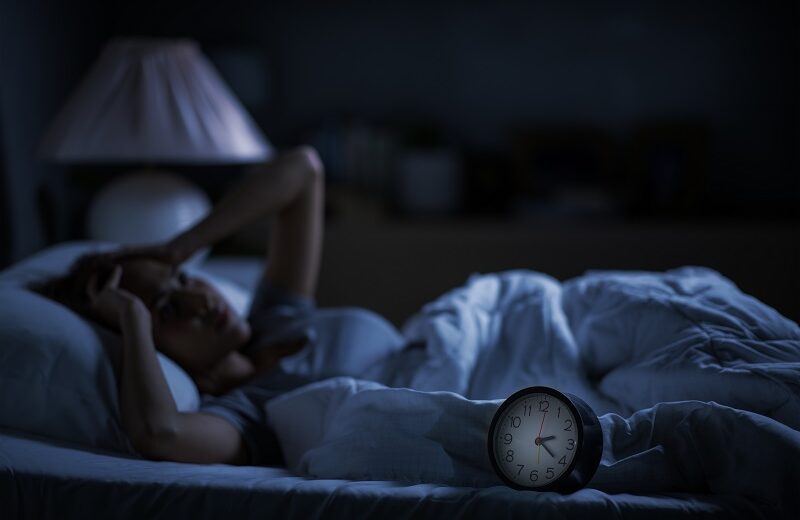While not fully understood, research shows that insomnia may indirectly affect hearing through various mechanisms. Chronic sleep deprivation associated with insomnia can lead to increased stress and elevated cortisol levels, which may subsequently impair blood flow to the inner ear. This impairment has the potential to contribute to conditions such as tinnitus and increased sensitivity to sound.
Why Does Insomnia Affect Your Hearing?
Contributing Factors
Insomnia can negatively affect hearing indirectly, primarily driven by stress, fatigue, and physiological changes.
Stress and Cortisol:
Chronic insomnia increases stress and cortisol levels, which could reduce blood flow to the inner ear. This can contribute to or worsen conditions like tinnitus (ringing or buzzing in the ears). A 2020 study found a correlation between poor sleep quality and increased tinnitus severity, most likely due to stress-related changes in hearing.
Auditory Processing:
Sleep deprivation can impair cognitive functions, including auditory attention. This can make it harder to filter or process sounds, leading to perceived hearing difficulties or heightened sensitivity to noise.
Tinnitus Aggravation:
Studies on insomnia have strongly linked poor sleep to tinnitus. Research, including a 2015 study, suggests that sleep disturbances can exacerbate tinnitus, creating a feedback loop where tinnitus further disrupts sleep, worsening both conditions.
Neurological Impact:
Lack of sleep affects the central nervous system, potentially altering how the brain interprets auditory signals. This may amplify existing hearing issues or make individuals more aware of auditory disturbances.
While insomnia doesn’t directly cause permanent hearing loss, its effects on stress, cognition, and ear health can intensify auditory problems. Managing insomnia through better sleep habits or medical intervention may help mitigate these effects.
Treatment Options
Treating Insomnia
Improving sleep quality can reduce stress and potentially alleviate related hearing issues.
Cognitive Behavioral Therapy for Insomnia
A structured, evidence-based therapy that addresses sleep-disrupting thoughts and behaviors. It’s highly effective for chronic insomnia and may indirectly reduce tinnitus severity by improving sleep.
Better Sleep Habits
Establishing a healthy sleep schedule, limiting screen time before bed, avoiding caffeine, and creating a relaxing bedroom environment can help.
Medications
A doctor may prescribe prescription sleep aids or low-dose antidepressants for short-term use, but long-term reliance is discouraged due to side effects.
Managing Tinnitus or Hearing Sensitivity
Specific treatments can target these auditory issues if insomnia or stress worsens tinnitus or hyperacusis.
Sound Therapy:
Using white noise machines, hearing aids with masking features, or low-level background music can help desensitize the brain to tinnitus or reduce sound sensitivity.
Cognitive Behavioral Therapy:
CBT tailored for tinnitus can help reframe negative perceptions of the sound, reducing its impact. This can also improve sleep by breaking the insomnia-tinnitus cycle.
Hearing Aids:
Hearing aids can help amplify external sounds, making tinnitus less noticeable and improving auditory processing.
Tinnitus Retraining Therapy (TRT):
Combines counseling with sound therapy to habituate the brain to tinnitus, potentially alleviating associated sleep issues.
Addressing Stress:
Since stress can worsen auditory symptoms, stress management is key.
Counseling or Therapy:
Addressing anxiety or stress through therapy can improve both sleep and auditory symptoms.
Biofeedback:
This technique helps patients control physiological responses to stress, potentially reducing tinnitus perception.
Relaxation Techniques:
Meditation practices, or progressive muscle relaxation, can help reduce stress and improve sleep, potentially easing auditory symptoms.
Medical Evaluation
Consult an ENT or Audiologist:
A specialist can assess for underlying ear conditions (e.g., hearing loss, ear infections) that insomnia might exacerbate. Tests like audiograms can clarify the extent of hearing issues.
Neurological or Sleep Specialist:
For complex cases, a neurologist or sleep specialist can evaluate for conditions like sleep apnea, which may contribute to both insomnia and auditory issues.
Individualized Care:
Treatments should be tailored to the individual, as the insomnia-hearing connection varies. A healthcare provider can help you create a comprehensive plan.
If you’re experiencing specific symptoms, consult an ENT, audiologist, or sleep specialist for a personalized diagnosis and treatment plan.





